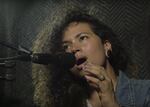To see Holland Andrews perform is to witness the channeling deep reserves of light and darkness, for the benefit of audiences battered by all manners of emotional trauma.
“I am offering a prescription with my music,” Andrews said, “to help the potential unease in their life at that moment. What do I have that you need?”
A composer, vocalist and visual artist, Andrews (who uses they/them pronouns) is one of the most beloved figures in Portland’s contemporary performance scene. Over the past 11 years, they’ve performed in gallery settings, clubs, even with the Oregon Symphony, making Portland a base for international touring. Their extended vocal technique, which can pivot from soaring operatic runs to a feral growl, can bring audiences to a standstill. Even those who don’t count themselves as fans of avant-garde music will follow Andrews on their music’s emotional journeys.
After spending the last 11 years in Portland, Andrews (a California native) is preparing a move to New York City. But not before one last performance kicking off Portland Institute for Contemporary Art's Time Based Art Festival.
The date, Sept. 5, is also the vinyl release one for a new Like a Villain album, "What Makes Vulnerability Good," on Accidental Records.
Andrews has made several albums over the past decade, but calls this the closest yet to replicating audiences’ live experience of Like a Villain.
"As an artist progresses, you get to see them unfold. And I think that happened with me. I think that shows in this album," they said.

Holland Andrews performs as Like a Villain, fusing extended vocal technique, composition, and visual elements.
Courtesy of Accidental Records
Andrews recorded with Arjan Miranda at Color Therapy Recording Studio in Northeast Portland. The challenge they faced, Andrews said, was conveying a recorded performance that could carry the same depth and emotional power fans have grown to expect at live performances.
“Doing one line out of my [effects] pedal chain and a room mic just wouldn’t have really cut it,” Andrews said. “We were thinking of ways that transform and keep the listener interested without sacrificing who I am as an artist.”
The answer included some synth effects and bigger arrangements with guests like saxophonist Joe Cunningham (Blue Cranes).
Touchstones for this emotionally charged collection of songs range from intimacy and connection (“My Hands”) to emotional liberation (“Free Now”) to several songs drawing on the fraught life and death of Andrews' mother.
"The relationship with my mom was a little challenging. She was someone who was diagnosed schizoaffective and struggled with alcohol abuse, drug abuse, bulimia," Andrews said. "I would see all these things as a child — and I would also see a sense of love and caring I’ve never felt from anyone else alive.”
Andrews was 16 when their mother committed suicide. While much of their songwriting has been informed over the years by this erratic, complicated history with someone so loving, so musically gifted and yet so profoundly ill, they say it was only recently that these experiences manifested as specific songs like “You Got It” — a searing expression of the fury Andrews' mother felt at losing custody of her children. “What Makes Vulnerability Good,” Andrews promised, is only the tip of the iceberg. They expect to spend a lot more time exploring the relationship on their next record.
“Having an opportunity as an adult to excavate my growing up with this incredible women who was just as much loving as she was dissonant in her own way, I possess that as well," Andrews said. "I can express these states within music.”
As Andrews comes near the end of their time in Portland, they call this time both sad and exciting.
“I’m so grateful for the opportunity I had here, the community,” Andrews said.
Andrews has moved into composing for dance artists and theater, and hopes the proximity to the intense concentration of performance artists in New York will make possible new collaborations.
In Portland, at this particular time in their musical development, Andrews said, “I couldn’t have had it any better. And because of that, I am now ready to move on to someplace different.”
